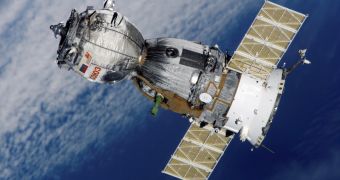On 8 March, a Soyuz spacecraft carrying two Russian astronauts and one South Korean astronaut was sent into space from the Baikonur launchpad in Kazakhstan. After two days of catching up with the ISS, the spacecraft is expected to dock at the International Space Station today at 9:00 a.m. EDT. The two Russian astronauts, commander Sergei Volkov and flight engineer Oleg Kononenko, will replace the crew of Expedition 16 on board the ISS, while So-Yeon Yi, the first Korean astronaut in space, will spend nine days on board, when she is to conduct a series of scientific experiments.
The medical spokesperson for Russia's space station Mission Control said in a press conference: "The crew, including the Korean female astronaut, So-yeon Yi, are feeling well and all of them are coping normally with zero gravity."
Expedition 16's commander Peggy Whitson and flight engineer Yuri Malenchenko are to return home after the crew exchange phase, while the third member of Expedition 17 is already on board the space station, Garrett Reisman, after having been flown to the ISS nearly a month ago with the Endeavor space shuttle during mission STS-123.
"Usually, the handover is very busy," said Volkov, whose father was also an astronaut between 1980 and 1990. The two replaced astronauts will return to Earth on 19 April after completing their six-month mission, along with Yi. "Because the Korean cosmonaut is going to be with us we expect, from the Korean side, a lot of experiments. It will keep us, every time, busy," said Volkov, expressing his will in participating in the experiments conducted by Yi during her nine-day stay at the ISS. All three astronauts are at their first space flight.
Exactly a week ago, ESA's Automated Transfer Vehicle Jules Verne docked at the ISS, thus completing the first unmanned flight. The re-supply ship will remain at the space station for six months before being sent to burn into Earth's atmosphere along with its waste cargo.
"So it's a very exciting time with lots of people coming and going as you can tell," Reisman said in a NASA interview.

 14 DAY TRIAL //
14 DAY TRIAL //